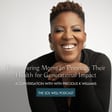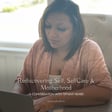
From Overwhelm to Equilibrium: Emotional Regulation with Dr. Amber Thornton
In this episode, we dive deep into the world of emotional regulation with Dr. Amber Thornton.
Key Takeaways:
- The importance of parental emotional regulation for child development
- Common signs of emotional dysregulation in parents
- The impact of unchecked parental emotions on children
- Strategies for improving emotional regulation in oneself and modeling it for children
- The role of self-compassion and accountability in the parenting journey
Guest Bio: Dr. Amber Thornton is a licensed Clinical Psychologist and strong advocate for the mental health and well-being of parents. She is the Host of The Dr. Amber’s Know and Grow Podcast, where she explores thought-provoking topics related to motherhood, parenting, relationships, career, mental health, and the ongoing journey of personal evolution.
Dr. Thornton resides in Washington, DC with her husband and 2 children. She is deeply passionate about helping other mothers and parents fulfill their goals, passions, and find more joy throughout their parenting experiences.
Episode Summary:
Join us as we explore the challenges and rewards of parenting with Dr. Amber Thornton. Learn how to manage your own emotions, create a calm home environment, and break the cycle of emotional dysregulation for future generations.
Episode Highlights:
- Defining emotional regulation and dysregulation
- The connection between parental emotions and child behavior
- Practical tips for managing stress and overwhelm
- The importance of self-care for parents
- Strategies for repairing and strengthening parent-child relationships
Resources:
- Dr. Amber Thornton's book, "A Parent's Guide to Self-Regulation"
- Amber Thornton, Psychologist, Washington, DC, 20018 | Psychology Today
- Website: www.dramberthornton.com
Connect with Dr. Amber on Social
Instagram: @dramberthornton
@dramber_knowandgrowpod
Share your experiences and connect with other parents on our social media channels. Let's build a supportive community together! By tuning in, you're taking a step towards prioritizing your mental health and creating a brighter future for your family.
Don't forget to subscribe to Sol Well for more inspiring stories and practical advice!
Want to be a guest on the pod? Send us an email to podcast@solwell.co





![Life after [baby] loss A conversation with Alishia Anderson image](https://media.zencastr.com/cdn-cgi/image/width=112,quality=85/image-files/61fb5028559b7100aee9f217/492cabf0-4479-488c-b19c-2873fe6bdce8.png)













